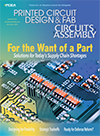News
Steve Hunter will be responsible for all manufacturing operations including logistics, inventory and purchasing procedures and policies.
"Hunter's past experience and overall knowledge of global logistics, inventory control and operations is exceptional," said Neil MacRaild, Americas general manager, in a statement.
Hunter has 15 years of logistics experience, most recently as global supply chain manager for a major medical device company.
If accurate, the EMS firms most likely to suffer would be Celestica (>10% of revenue comes from Cisco), Solectron (16%) and Jabil (15%).
Cisco forecast Q2 sales of $6.03 billion to $6.15 billion, lower than the Wall Street consensus of $6.21 billion.
Cisco's finished goods inventory increased during the last quarter to $714 million from $656 million. The company's book-to-bill is below 1.0, the mark of future expansion, Whitmore reported.
"[W]e expect soft trends in the communications infrastructure end market (for EMS vendors) to extend well into 2005. As such, we remain cautious on those EMS vendors with significant exposure to this end market," Whitmore said.
Solectron appears "most vulnerable" to softness at Cisco, Whitmore said.
Nashville, TN, Nov. 10 —Mike Bixenman, Kyzen Corp.'s CTO, will present a paper on "Optimizing Cleaning Energy in Batch and Inline Spray Systems" at the Nov. 11 meeting of the SMTA Intermountain Chapter. Pat Ryan of Indium Corp. will follow with a presentation on lead-free.
The meeting will take place from 5:30 to 8:30 p.m. at Computrol in Meridian, ID, and will focus on cleaning and lead-free.
Carlsbad, CA - FUJI Do Brasil Máquinas Industriais LTDA has signed on to market Asymtek's automated fluid dispensing systems throughout South America and Brazil. Established in 1995, Fuji Do Brasil is headquartered in Sao Paulo, with branches in Manaus and Campinas.
The company has over 600 machines installed in Brazil--reportedly 50% of the SMT equipment market share. The Sao Paulo office has a complete SMT line and partners with UNISAL University for SMT process training. The Manaus facility partners with NOKIA to offer SMT process training, rework and maintenance for customers.
TORONTO, Nov. 8 - SMTC Corp. today reported third-quarter net earnings of $2.9 million on revenue of $60.8 million.
Last year the electronics manufacturing services provider reported net earnings of $2.6 million on $77 million in sales.
Sequentially, net earnings were up from $1 million, although sales dropped from $66.3 million.
SMTC settled two legal disputes during the quarter. In a claim for obsolete inventory previously written down, the company recovered $1.8 million, which was recorded in cost of sales. And the company adjusted by $1.7 million an earlier restructuring charge taken for early termination of a lease.
SMTC took restructuring charges of $1 million during the quarter.
Gross profit was $7.3 million, or 12.1% of revenue, compared with $8.1 million (10.6% of revenue) last year and $7.3 million (11.1%) in the second quarter. Cash from operations was $3.9 million; as a result the company's outstanding revolving credit facility dropped to $9.7 million from $13.3 million. The company reported no cash balance on its balance sheet. Debt was reduced by $4 million during the quarter.
Through Oct. 3 SMTC posted revenue of $196.6 million, down from $229.2 million in 2003. Net earnings were $3.8 million, compared with a net loss of $37.2 million.
SMTC was recently notified by Nasdaq that it has regained compliance with the minimum bid price requirement of $1 per share.
ST. LOUIS, Nov. 4 -- LaBarge Inc. today reported first-quarter 2005 revenues rose 47% year-on-year, the best quarter in the company's history.
For the quarter ended Oct. 3, LaBarge posted net sales of $43.6 million, up from $29.7 million a year ago. Net earnings from continuing operations rose 68% to $2.3 million, versus $1.4 million last year. Total net earnings grew 81%; fiscal 2004 first-quarter earnings included a net loss from discontinued operations of $102,000. The first-quarter 2005 results include net sales of $12.9 million and earnings from the company's Pittsburgh operation, acquired in February 2004.
Gross margin remained 23%. Selling and administrative expense declined as a percentage of sales to 13%, from 16% in 2004. Total debt rose to $41 million, up from $37.7 million sequentially.
The company said bookings of new business -- particularly from the defense, government systems and natural resources market sectors -- were strong during the quarter. Order backlogs were down 5% sequentially to $149.5 million.
Defense customers made up 42% of sales, industrial 20%, natural resources 19%. The remaining 19% came from commercial aerospace and government systems, among other sectors.
The company guided for second-quarter sales and earnings substantially higher than last year and slightly higher than the first quarter.
Press Releases
- Altus Reports Growing Demand for Guidance on Convection Reflow Oven Specification
- Coherix Opens New Adhesive-Dispensing Vision Center in Europe
- Pan Pacific Strategic Electronics Symposium Program Finalized
- The Most Critical 2 Inches in SMT Manufacturing – When a Splice Fails, the Line Fails, Full Stop. Throughput and Yield Depend on One Overlooked Moment


